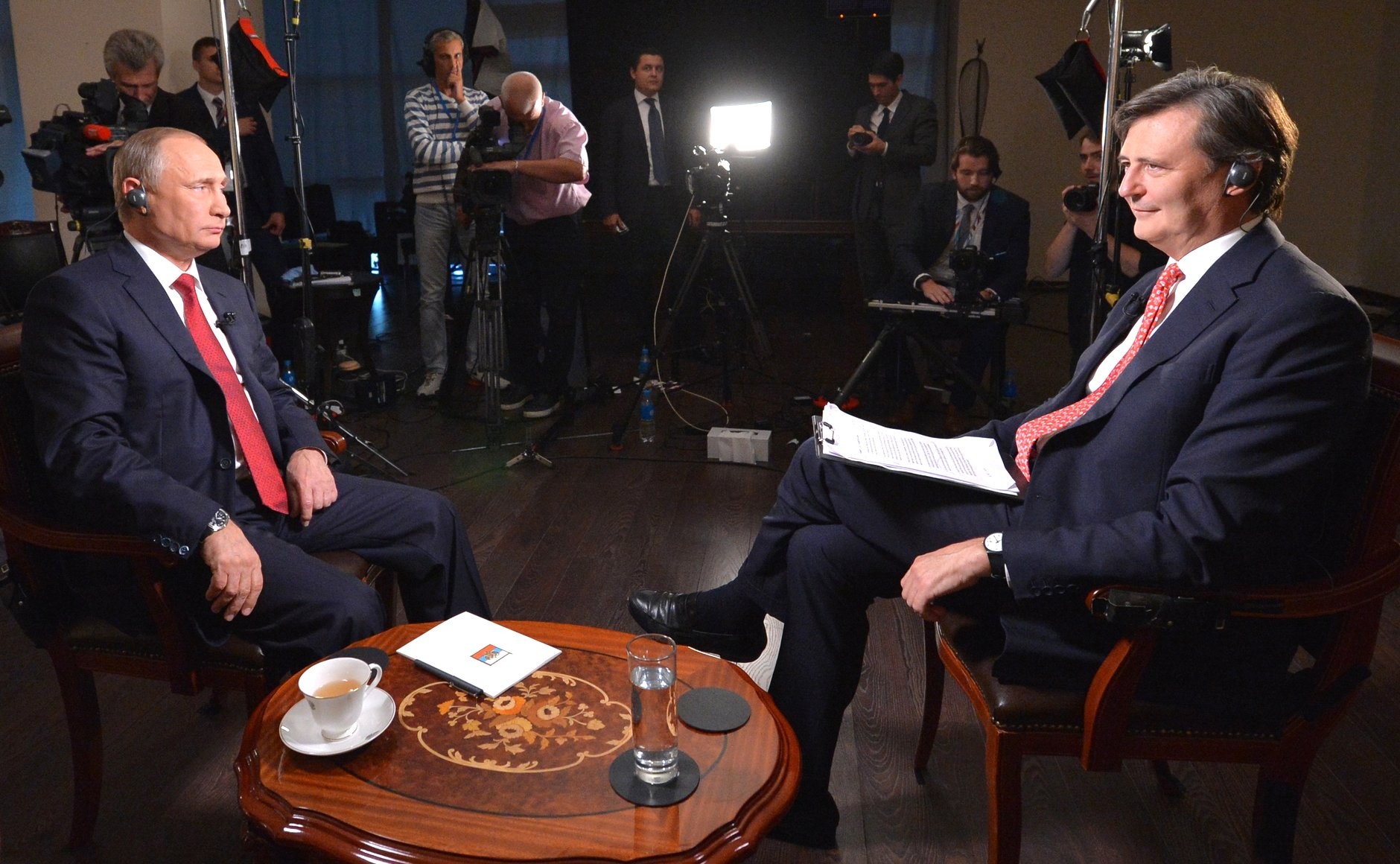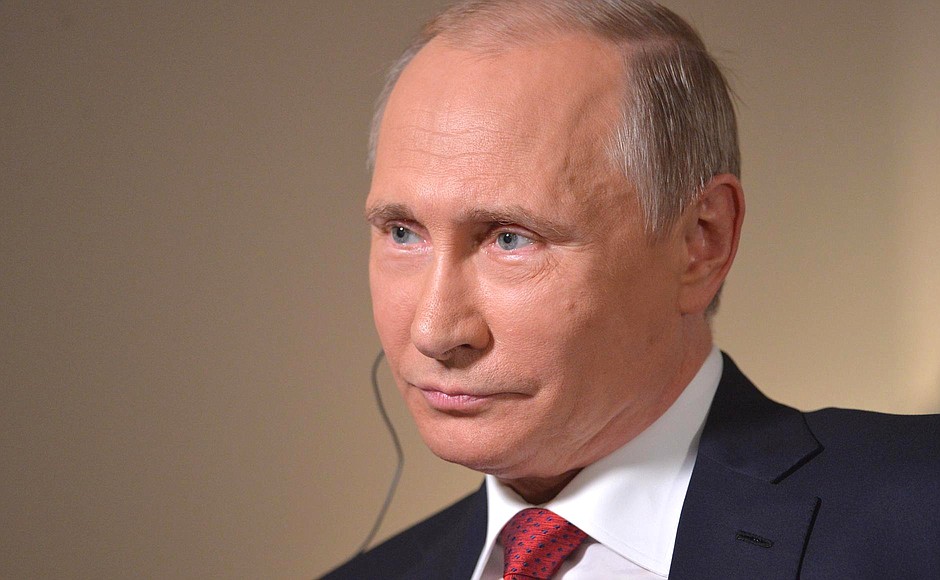On September 1,
Vladimir Putin gave an interview to the international media
company Bloomberg in Vladivostok.
September 2, 2016
05:30
Vladivostok
John Micklethwait: Mr
President, thank you very much for speaking to Bloomberg. Here
in Vladivostok we're on the edge of the Pacific
and on the eve of the second Eastern Economic forum.
What do you hope to achieve at it?
President
of Russia Vladimir Putin: We would like to draw
the attention of our partners, of potential investors
to the Russian Far East. In this sense, the Forum
as an event is similar to other regional forums of this
kind. Russia hosts a lot of such forums, including
the International Economic Forum in St Petersburg, (usually
in the beginning of summer), as well
as the Economic Forum in Sochi.
The Far East
is of particular significance for us in terms of this
region’s priority development. Over the last few years, let us say even
over the last decades, we were faced with many problems here. We paid
little attention to this territory although it deserves a lot more
of it, because it concentrates great wealth as well as opportunities
for Russia’s future development. Not only for Russia alone, but also
for the development of the entire Asia-Pacific region
(APR), because this land is very rich in natural and mineral
resources.
When we talk about
the Far East we usually mean the Far East itself, including Primorye
Territory, Khabarovsk Territory, Kamchatka, and Chukotka, as well
as Eastern Siberia. All this area contains tremendous resources, including
oil and gas, 90 percent of Russian tin, 30 percent of Russian
gold, 35 percent of forest, 70 percent of Russia’s fish is harvested
in the local waters.
Finally, we are
resuming the manufacturing of sea vessels here, first of all
for civilian purposes. Just earlier today I witnessed
the commissioning of one of the most promising sites
of this kind.
And this is
also a good opportunity for humanitarian exchanges with our
neighbours. Our intention is to develop music, theatre and exhibition
activities here. Just recently Mr Gergiev, a distinguished Russian
musician and conductor, held his concerts here. We are going to set
up a branch of the St Petersburg Mariinsky Theatre here. We are
also planning to open local branches of the Hermitage Museum
and the Vaganova Academy of Russian Ballet.

3 of 4

3 of 4
As you can
see, we are now present in the building of the Far Eastern
Federal University. I am sure you too have had a chance
to assess the size of the University – the number
of foreign students studying here is already in the thousands;
there is also a great number of foreign professors. We would like
to see science and higher education developing here, so that it could
become one of the major research centres in the entire APR
system. Undoubtedly a lot remains to be done here, but given
the labour market demand, the relevance of such
a university is undeniable.
In addition
to everything that I have already mentioned, there is another domain
that we consider relevant and having good prospects – marine biology.
For many years this region has been home for one
of the leading institutes of the Russian Academy
of Sciences, the Institute of Marine Biology. You know, we are
launching a new centre here; we have built an oceanarium on its
premises, which is supposed to be not only a public place where
people, I am sure, will enjoy the wildlife, but also part
of the Institute of Marine Biology. A very interesting
and promising cluster has formed here, and we would be happy if our
potential investors, our counterparts from abroad, first of all those from
the Asia-Pacific region, knew more about it.
John Micklethwait: One
of the guests who have coming is Shinzo Abe. There seem to be
the beginning of a political deal: you might give up one
of the Kuril Islands in exchange for greater economic
cooperation? Are you opened to a deal of that sort?
Vladimir Putin: We
do not trade territories although concluding a peace treaty with Japan is
certainly a key issue and we would like to find a solution
to this problem together with our Japanese friends. Back in 1956, we
signed a treaty and surprisingly it was ratified both
by the Supreme Soviet of the Soviet Union
and the Japanese Parliament. But then Japan refused to implement
it and after that the Soviet Union also, so to say, nullified
all the agreements reached within the framework
of the treaty.
Some years ago our
Japanese counterparts asked us to resume the discussions
of the issue and so we did meeting them halfway. Over
the passed couple of years the contacts were practically frozen
on the initiative of the Japanese side, not ours.
At the same time, presently our partners have expressed their
eagerness to resume discussions on this issue. It has nothing
to do with any kind of exchange or sale. It is about
the search for a solution when neither party would be
at a disadvantage, when neither party would perceive itself
as conquered or defeated.
John Micklethwait: Are
you as close to a deal now as you have been since
the 1960s? Is it better now than any time since then?
Vladimir Putin: I don’t
think that we are closer than in 1956 but anyway we have resumed our
dialogue and agreed that our foreign ministers and relevant experts
at the level of deputy ministers will intensify this work.
Naturally, this issue has always been a subject of discussions
between the Russian President and the Prime Minister. I am
sure that during the meeting with Mr Abe here in Vladivostok this
issue will also be discussed, but finding a solution requires it
to be well thought out and prepared, and I reiterate,
a solution that is not based on the principles of causing
damage, but, on the contrary, on the principles
of creating conditions for developing long-term ties between
the two countries.
John Micklethwait: You
seem to be more relaxed about territory in Asia. You mentioned
the Kurils, you gave the island of Tarabarov back to China.
Would you consider giving back Kaliningrad as a tribute?
Vladimir Putin: We
handed over nothing, those territories were disputed and we have been
negotiating this issue with the People's Republic of China, let me
stress that, for 40 years, and finally managed to come
to an agreement. One part of the territory was assigned
to Russia, while another part – to the People's Republic
of China.
Notably, it was
only possible, and this is very important, due to the high level
of trust Russia and China reached in their relations
by that time. If we reach the same level of trust with Japan, we
might be able to reach certain compromises.
However, there is
a fundamental difference between the issue related to Japan’s
history and our negotiations with China. What is it all about?
The Japanese issue resulted from World War II and is stipulated
in the international instruments on the outcomes
of World War II, while our discussions on border issues with our
Chinese counterparts have nothing to do with World War II or any
other military conflicts. This is the first, or rather, I should
say, the second point.
Thirdly, regarding
the Western part. You have mentioned Kaliningrad.
John Micklethwait: It
was a joke.
Vladimir Putin: All
jokes aside. If someone is willing to reconsider the results
of World War II, let us discuss this. But then we will have
to discuss not only Kaliningrad, but also the eastern lands
of Germany, the city of Lvov, a former part of Poland,
and so on, and so forth. There are also Hungary and Romania
on the list. If someone wants to open this Pandora's box
and deal with it, all right, go for it then.







No comments:
Post a Comment